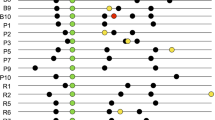Abstract
Post-transplant microbial diversity in the gastrointestinal tract is closely associated with clinical outcomes following allogeneic hematopoietic stem cell transplantation (allo-HSCT). However, little is known about the impact of the fecal microbiota before allo-HSCT. We analyzed fecal samples approximately 2 weeks before conditioning among 107 allo-HSCT recipients between 2013 and 2015. Microbial analysis was performed using 16S rRNA gene sequencing. Operational taxonomic unit-based microbial diversity was estimated by calculating the Shannon index. Patients were classified into three groups based on the diversity index: low (<2), intermediate (2, 3), and high (>3) diversity (18 (16.8%), 48 (44.9%), and 41 (38.3%) patients, respectively). There were no significant differences in the 20-month overall survival, cumulative incidence of relapse, and non-relapse mortality among three groups. The cumulative incidence of grade II to IV acute graft-versus-host disease (aGVHD) was similar among the three groups (low 55.6%; intermediate 35.4%; high 48.8%, p = 0.339, at day 100). Furthermore, we found no differences in the cumulative incidence of grade II to IV acute gastrointestinal GVHD among the three groups (low 38.9%; intermediate 21.3%; high 24.4%, p = 0.778, at day 100). Regarding the composition of microbiota before allo-HSCT, aGVHD patients showed a significantly higher abundance of phylum Firmicutes (p < 0.01) and a lower tendency for Bacteroidetes (p = 0.106) than non-aGVHD patients. Maintenance of Bacteroidetes throughout allo-HSCT may be a strategy to prevent aGVHD.




Similar content being viewed by others
References
Arumugam M, Raes J, Pelletier E, Le Paslier D, Yamada T, Mende DR et al (2011) Enterotypes of the human gut microbiome. Nature 473:174–180
Scher JU, Sczesnak A, Longman RS, Segata N, Ubeda C, Bielski C et al (2013) Expansion of intestinal Prevotella copri correlates with enhanced susceptibility to arthritis. elife 2:e01202
Ivanov II, Atarashi K, Manel N, Brodie EL, Shima T, Karaoz U et al (2009) Induction of intestinal Th17 cells by segmented filamentous bacteria. Cell 139:485–498
Smith MI, Yatsunenko T, Manary MJ, Trehan I, Mkakosya R, Cheng J et al (2013) Gut microbiomes of Malawian twin pairs discordant for kwashiorkor. Science 339:548–554
Taur Y, Jenq RR, Perales MA, Littmann ER, Morjaria S, Ling L et al (2014) The effects of intestinal tract bacterial diversity on mortality following allogeneic hematopoietic stem cell transplantation. Blood 124:1174–1182
Holler E, Butzhammer P, Schmid K, Hundsrucker C, Koestler J, Peter K et al (2014) Metagenomic analysis of the stool microbiome in patients receiving allogeneic stem cell transplantation: loss of diversity is associated with use of systemic antibiotics and more pronounced in gastrointestinal graft-versus-host disease. Biol Blood Marrow Transplant 20:640–645
Jenq RR, Taur Y, Devlin SM, Ponce DM, Goldberg JD, Ahr KF et al (2015) Intestinal blautia is associated with reduced death from graft-versus-host disease. Biol Blood Marrow Transplant 21:1373–1383
Mori J, Ohashi K, Yamaguchi T, Ando M, Hirashima Y, Kobayashi T et al (2012) Risk assessment for acute kidney injury after allogeneic hematopoietic stem cell transplantation based on Acute Kidney Injury Network criteria. Intern Med 51:2105–2110
Rowlings PA, Przepiorka D, Klein JP, Gale RP, Passweg JR, Henslee-Downey PJ et al (1997) IBMTR Severity Index for grading acute graft-versus-host disease: retrospective comparison with Glucksberg grade. Br J Haematol 97:855–864
Vigorito AC, Campregher PV, Storer BE, Carpenter PA, Moravec CK, Kiem HP et al (2009) Evaluation of NIH consensus criteria for classification of late acute and chronic GVHD. Blood 114:702–708
Tsuda A, Suda W, Morita H, Takahashi K, Takagi A, Koga Y et al (2015) Influence of proton-pump inhibitors on the luminal microbiota in the gastrointestinal tract. Clin Transl Gastroenterol 6:e89
Sorror ML, Maris MB, Storb R, Baron F, Sandmaier BM, Maloney DG et al (2005) Hematopoietic cell transplantation (HCT)-specific comorbidity index: a new tool for risk assessment before allogeneic HCT. Blood 106:2912–2919
Weber D, Oefner PJ, Hiergeist A, Koestler J, Gessner A, Weber M et al (2015) Low urinary indoxyl sulfate levels early after transplantation reflect a disrupted microbiome and are associated with poor outcome. Blood 126:1723–1728
Biagi E, Zama D, Nastasi C, Consolandi C, Fiori J, Rampelli S et al (2015) Gut microbiota trajectory in pediatric patients undergoing hematopoietic SCT. Bone Marrow Transplant 50:992–998
Chiusolo P, Metafuni E, Sterbini FP, Giammarco S, Masucci L, Leone G et al (2015) Gut microbiome changes after stem cell transplantation. Blood 126:1953
Acknowledgements
We are very grateful to the patients in the current study and would like to thank the nursing staff at our institution.
Author information
Authors and Affiliations
Contributions
N.D., H.M., H.N., M.H., E.S., N.T., H.S., K.H., and K.O. designed this study. N.D., M.S., S.S., A.I., Y.S., Y.N., K.I, K.Y., T.K., and K.K. collected samples. S.S., J.O., I.M., H.M., Y.F., D.S., W.S., K.T., and K.A. extracted DNA and analyzed fecal samples. N.D. wrote the manuscript.
Corresponding author
Ethics declarations
This study was approved by the Ethics Committee of Tokyo Metropolitan Cancer and Infectious Diseases Center, Komagome Hospital.
Conflict of interest
The authors declare that they have no conflict of interest.
Informed consent
Informed consent was obtained from all patients prior to being included in the study.
Rights and permissions
About this article
Cite this article
Doki, N., Suyama, M., Sasajima, S. et al. Clinical impact of pre-transplant gut microbial diversity on outcomes of allogeneic hematopoietic stem cell transplantation. Ann Hematol 96, 1517–1523 (2017). https://doi.org/10.1007/s00277-017-3069-8
Received:
Accepted:
Published:
Issue Date:
DOI: https://doi.org/10.1007/s00277-017-3069-8




